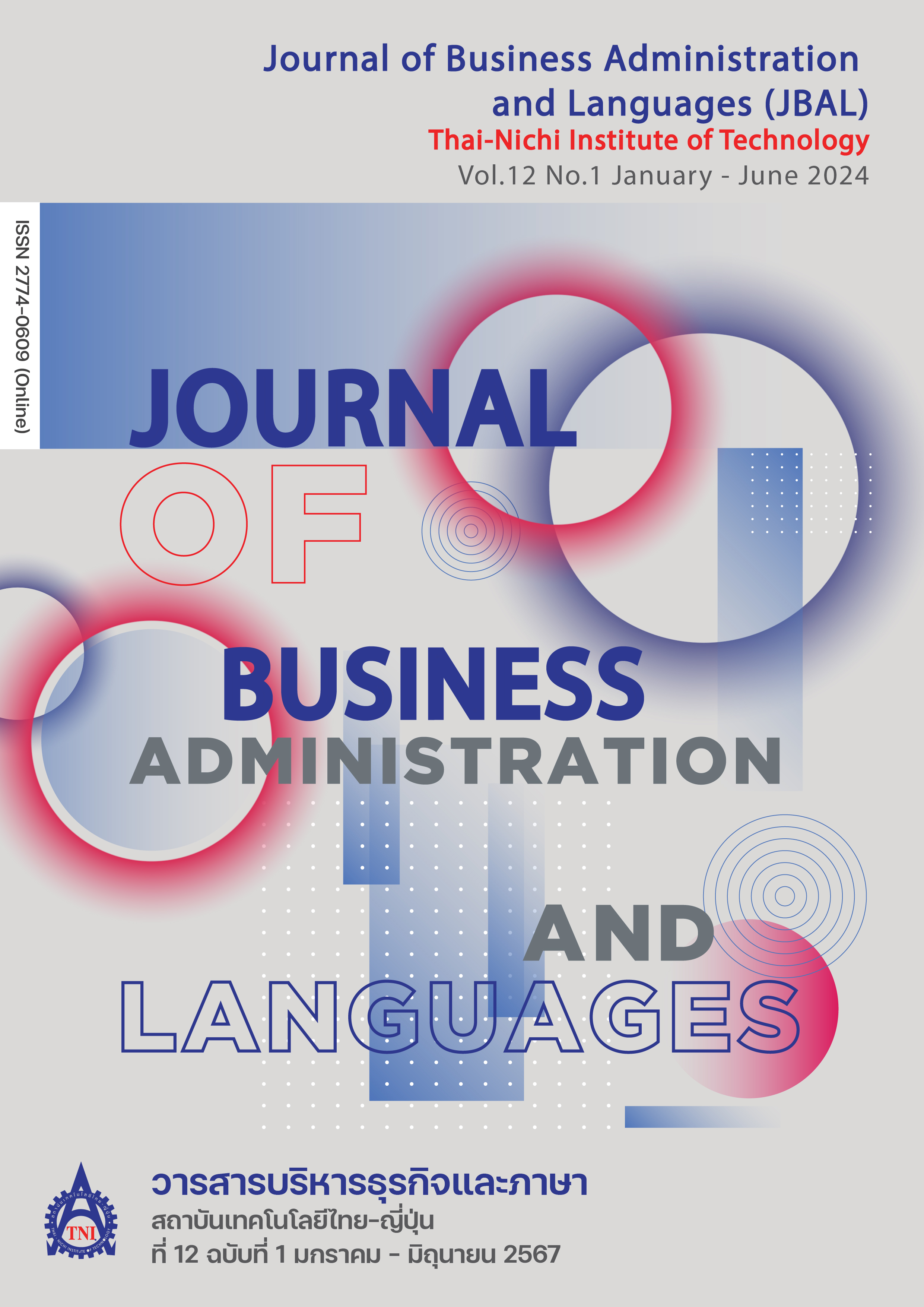Benefits and Challenges of Assisted Technology in Developing English Email Writing Skills among Adult Learners in the Logistics Profession
Main Article Content
บทคัดย่อ
The purposes of this study are: 1) to examine the adult learners' satisfaction on the assisted technology for developing English email writing skills of logistics professionals, and 2) to find out the benefits and challenges of the assisted technology for developing English email writing skills of logistics professionals. The research instruments consist of the online email writing course and a 5-Likert scale evaluation forms regarding the learners’ satisfaction on the learning tools and open-ended questions about benefits and challenges after using the learning tools. The 4-week online email writing course comprises a two-hour live conference via Zoom and 30-minute video-on-demand clip for each week. The on-demand video clips and recorded live conference serve as a pre-live classroom session overview and post-class review. The lessons focusing on replying to inquiry emails cover the topics of providing important information, requesting politely, informing about attachment, and closing appropriately. The participants, who voluntarily attended, are 60 full-time employees from one internationally renowned logistics company. Before designing the course, a needs analysis was carried out to identify the preferred time, duration, and subjects for study. The findings indicated that the participants had favorable views of the online lessons and appreciated the technology-supported learning activities. Each tool used in the learning process fulfilled its intended purpose and helped to boost the learner’s motivation to engage in the learning process; however, some challenges were also discussed in the study.
Article Details

อนุญาตภายใต้เงื่อนไข Creative Commons Attribution-NonCommercial-NoDerivatives 4.0 International License.
นโยบายการรับบทความ
กองบรรณาธิการวารสารสถาบันเทคโนโลยีไทย-ญี่ปุ่น มีความยินดีรับบทความจากอาจารย์ นักศึกษา และผู้ทรงคุณวุฒิในสาขาบริหารธุรกิจและภาษา ที่เขียนเป็นภาษาไทยหรือภาษาอังกฤษ ซึ่งผลงานวิชาการที่ส่งมาขอตีพิมพ์ต้องไม่เคยเผยแพร่ในสิ่งพิมพ์อื่นใดมาก่อน และต้องไม่อยู่ในระหว่างการพิจารณาของวารสารอื่นที่นำส่ง ดังนั้นผู้สนใจที่จะร่วมเผยแพร่ผลงานและความรู้ที่ศึกษามาสามารถนำส่งบทความได้ที่กองบรรณาธิการเพื่อเสนอต่อคณะกรรมการกลั่นกรองบทความพิจารณาจัดพิมพ์ในวารสารต่อไป ทั้งนี้บทความที่สามารถเผยแพร่ได้ประกอบด้วยบทความวิจัย ผู้สนใจสามารถศึกษาและจัดเตรียมบทความจากคำแนะนำสำหรับผู้เขียนบทความ
การละเมิดลิขสิทธิ์ถือเป็นความรับผิดชอบของผู้ส่งบทความโดยตรง บทความที่ได้รับการตีพิมพ์ต้องผ่านการพิจารณากลั่นกรองคุณภาพจากผู้ทรงคุณวุฒิและได้รับความเห็นชอบจาก กองบรรณาธิการ
ข้อความที่ปรากฏภายในบทความของแต่ละบทความที่ตีพิมพ์ในวารสารวิชาการเล่มนี้ เป็น ความคิดเห็นส่วนตัวของผู้เขียนแต่ละท่าน ไม่เกี่ยวข้องกับสถาบันเทคโนโลยีไทย-ญี่ปุ่น และคณาจารย์ท่านอื่น ๆ ในสถาบัน แต่อย่างใด ความรับผิดชอบด้านเนื้อหาและการตรวจร่างบทความแต่ละบทความเป็นของผู้เขียนแต่ละท่าน หากมีความผิดพลาดใด ๆ ผู้เขียนแต่ละท่านจะต้องรับผิดชอบบทความของตนเองแต่ผู้เดียว
กองบรรณาธิการขอสงวนสิทธิ์มิให้นำเนื้อหา ทัศนะ หรือข้อคิดเห็นใด ๆ ของบทความในวารสารวิชาการ สถาบันเทคโนโลยีไทย-ญี่ปุ่น ไปเผยแพร่ก่อนได้รับอนุญาตจากผู้นิพนธ์อย่างเป็นลายลักษณ์อักษร ผลงานที่ได้รับการตีพิมพ์ถือเป็นลิขสิทธิ์ของวารสารสถาบันเทคโนโลยีไทย-ญี่ปุ่น
หากต้องการสอบถามข้อมูลเพิ่มเติมที่
- กองบรรณาธิการ วารสารสถาบันเทคโนโลยีไทย-ญี่ปุ่น
- ฝ่ายวิจัยและนวัตกรรม สถาบันเทคโนโลยีไทย-ญี่ปุ่น
เลขที่ 1771/1 สถาบันเทคโนโลยีไทย-ญี่ปุ่น ซอยพัฒนาการ 37-39 ถนนพัฒนาการ แขวงสวนหลวง เขตสวนหลวง กรุงเทพมหานคร 10250 ติดต่อกับคุณพิมพ์รต พิพัฒนกุล (02) 763-2752 , คุณอาริสา จิระเวชถาวร (02) 763-2600 Ext. 2704 Fax. (02) 763-2754 หรือ E-mail: JBAL@tni.ac.th
เอกสารอ้างอิง
Al Momani, J. A., & Abu Musa, M. A. (2022). A comparative study of the effectiveness of using Padlet in distance learning: Viewpoint of postgraduate students. Journal of Education and e-Learning Research, 9(2), 95–102.
Anthony, L. (1997). Defining English for specific purposes and the role of the ESP practitioner. Center for Language Research 1997 Annual Review, 115–120. Retrieved from http://www.laurenceanthony.net/abstracts/Aizukiyo97.pdf
Arani, J. A. (2014). A blended-learning setting in English for medical purposes course incorporating competencies. International Journal of Language and Linguistics, 1(2), 31–36. Retrieved from https://ijllnet.com/journal/index/2139
Bok, G. I. (2021). Adult learners’ challenges in distance learning: A case study in Universiti Sains Malaysia. Issues in Educational Research, 31(1), 19–36.
Deni, A. R., & Zainal, Z. I. (2018). Padlet as an educational tool: Pedagogical considerations and lessons learnt. Proceedings of the 10th International Conference on Education Technology and Computers. 156–162. doi:10.1145/3290511.3290512
Diep, A. N., Zhu, C., Cocquyt, C., de Greef, M., Vo, M. H., & Vanwing, T. (2019). Adult learners' needs in online and blended learning. Australian Journal of Adult Learning, 59(2), 223–253.
Fisher, C. D. (2017). Padlet: An online tool for learner engagement and collaboration. Academy of Management Learning and Education, 16(1), 163–171. doi:10.5465/amle.2017.0055
Hapçi, S. Ç. (2017). Adults as lifelong language learners. Journal of Educational and Instructional Studies in The World. 7(2), 93–100. Retrieved from https://arastirmax.com/en/system/files/dergiler/116392/makaleler/7/2/arastirmax-adults-lifelong-language-learners.pdf
Kittiya Keadplang. (2020). Development of communicative English course through content-based instruction for adult learners, Nonthaburi province, Thailand (in Thai). Journal of Graduate Studies in Northern Rajabhat Universities, 10(2), 17–30.
Manoharan, S. R., Hua, T. K., & Sultan, F. M. M. (2022). A comparison of online learning challenges between young learners and adult learners in ESL classes during the COVID-19 pandemic: A critical review. Theory and Practice in Language Studies, 12(1), 28–35.
Nunpaporn Durongbhandhu, & Danuchawat Suwanasilp. (2023). Computer-assisted English lessons for logistics with task-based language teaching for enhancing receptive and productive vocabulary knowledge of EFL Thai learners. LEARN Journal: Language Education and Acquisition Research Network, 16(1), 47–74.
Ordonia, G. A. (2015). Learning English language for adults and professional Thai students : In search of strategy that prompts motivation. Christian University of Thailand Journal, 21(2), 163–180.
Phurinat Thirasisombat. (2021). Attitude of Thai employees working in logistics companies toward writing English emails in the workplace (Master's independent study). Retrieved from https://ethesisarchive.library.tu.ac.th/thesis/2021/TU_2021_6321040179_15952_20216.pdf
Saowakhon Khunnawut. (2008). Call: Advantages and limitations (in Thai). RMUTP Research Journal, 2(2), 226–233. doi:10.14456/jrmutp.2008.21
Souri, D., & Merç A. (2021). Adult EFL learners’ drives to improve their English in private language schools. International Journal of Psychology and Educational Studies, 8(3), 92–102.
Sweeney, E. M., Beger, A. W., & Reid, L. (2021). Google Jamboard for virtual anatomy education. Clinical Teacher, 18(4), 341–347. doi:10.1111/tct.13389
Vanslambrouck, S., Zhu, C., Tondeur, J., Philipsen, B., & Lombaerts, K. (2016). Adult learners’ motivation to participate and perception of online and blended environments. Proceedings of the 15th European Conference on E-Learning (ECEL), 750–757. Retrieved from https://biblio.ugent.be/publication/8518172
Virto, N. R., & López, M. F. B. (2020). Google Jamboard interactive smartboard: Are innovative approaches useful in personal branding assignments?. Proceedings of the 2nd World Conference on Future of Education, 30–35. Retrieved from https://www.dpublication.com/wp-content/uploads/2019/09/4027-WCF.pdf
Wirithipa Kepnil. (2020). The problems of English e-mail writing among Thai workers in a logistics company (Master’s independent study). Retrieved from https://ethesisarchive.library.tu.ac.th/thesis/2020/TU_2020_6121040569_13181_12999.pdf


